- News
- Reviews
- Bikes
- Components
- Bar tape & grips
- Bottom brackets
- Brake & gear cables
- Brake & STI levers
- Brake pads & spares
- Brakes
- Cassettes & freewheels
- Chains
- Chainsets & chainrings
- Derailleurs - front
- Derailleurs - rear
- Forks
- Gear levers & shifters
- Groupsets
- Handlebars & extensions
- Headsets
- Hubs
- Inner tubes
- Pedals
- Quick releases & skewers
- Saddles
- Seatposts
- Stems
- Wheels
- Tyres
- Tubeless valves
- Accessories
- Accessories - misc
- Computer mounts
- Bags
- Bar ends
- Bike bags & cases
- Bottle cages
- Bottles
- Cameras
- Car racks
- Child seats
- Computers
- Glasses
- GPS units
- Helmets
- Lights - front
- Lights - rear
- Lights - sets
- Locks
- Mirrors
- Mudguards
- Racks
- Pumps & CO2 inflators
- Puncture kits
- Reflectives
- Smart watches
- Stands and racks
- Trailers
- Clothing
- Health, fitness and nutrition
- Tools and workshop
- Miscellaneous
- Buyers Guides
- Features
- Forum
- Recommends
- Podcast
feature
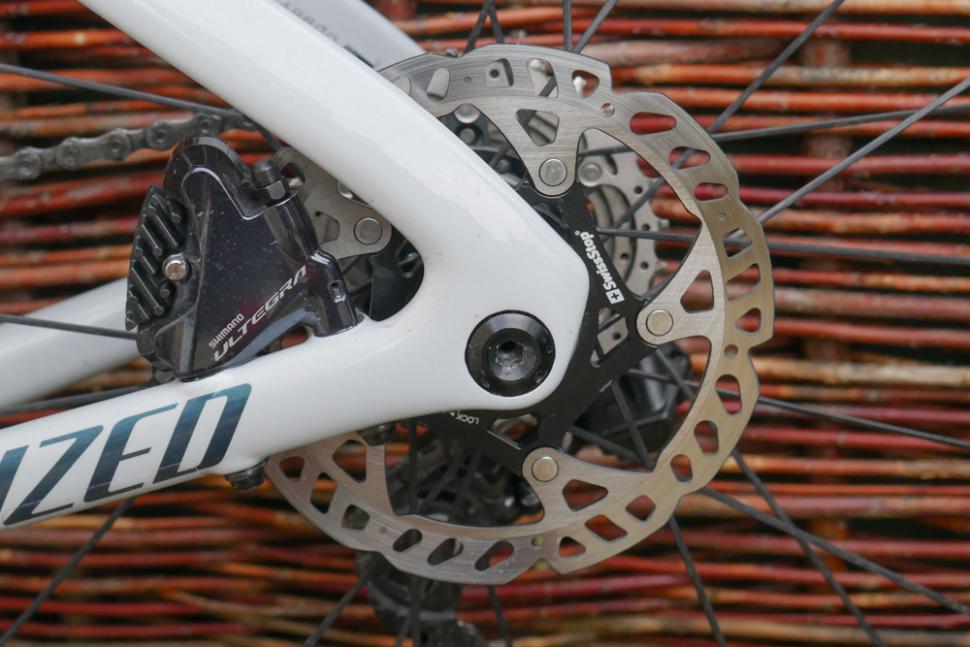 SwissStop Catalyst Rotors 140mm
SwissStop Catalyst Rotors 140mmWhat’s wrong with Chris Froome’s disc brakes?
Chris Froome moved from the Ineos Grenadiers (formerly Team Sky) to Israel Start-Up Nation for the 2021 season, and he’s done more than change his jersey. Froome has also switched from Pinarello to Factor bikes, a move that will see him racing on disc brakes for the first time in his career.
But in a video where he tried his hand at reviewing his new Factor Ostro VAM, Froome wasn’t singing the praises of disc brakes. Despite saying that the performance in both wet and dry conditions impressed him, he didn’t feel the same way about all aspects of his new components. It's a very honest review of the bike which is certainly refreshing from a pro rider, most of whom usually repeat the lines that the marketing department has given them.
> 8 reasons not to get disc brakes — find out the hassles before you switch
We’ve re-watched Froome's review, paying particular attention to his comments about what he doesn’t like about those disc brakes, and we’ve noted the likely causes, the fixes, and how to avoid the issues in the first place. You can thank us later, Chris. Maybe in your Tour de France winner’s speech.
Froome makes a valid point regarding disc brakes being something that many racers wouldn’t have chosen had the manufacturers not pushed them. Froome says that they “are going to have to adapt and learn to use them, because if you're not on disc brakes already it's only a matter of time before you're made obsolete and forced onto them.”
Froome's points are also common issues that many riders that are new to disc brakes will encounter, so it is certainly useful to explore the tips and tricks that will make the disc-brake user experience better if you too have just switched over.
Before we dive in, we’re not about to bash either rim brakes or disc brakes. Each system has good and bad points and has been used in and out of the racing world just fine for years.
Right then, let’s get into the issues that Froome cited in his video, and see if we can help fix them.
A downside to disc brakes is the constant rubbing
Yep, just like a rim-brake, a disc system will rub if incorrectly set up. If the rubbing is constant and you can hear the noise through the whole rotation of the rotor, the calliper needs repositioning. Check the thru-axle is tight first.
> How to look after disc brakes — 7 ways to get the best performance
If you can hear a noise at only a certain point in the rotation, the rotor is likely bent/warped. Straighten it with a disc brake rotor truing tool.
Potential for mechanicals
What can go wrong with a hydraulic disc brake system out on the road? There are a few things like a loss of braking power caused by a leak in the system, the brake rubbing, or even just noise caused by contamination.
Fixing these problems while out training or on a leisurely ride is a case of riding home with one working brake, attempting to straighten the rotor, or simply putting up with the noise.
> Everything you need to know about disc brakes - read our definitive guide
If you’re a pro in a race, you can switch to your spare £11,000 bike at a quiet moment, but an issue with a rim brake setup would likely have you dropping back to the team car anyway.
We'd say that a snapped brake cable and a loss of pressure in a hydraulic disc brake system are equally rare. To avoid issues with either system, check your brakes regularly and keep on top of cleaning and maintenance.
Overheating
If you drag any brake system – ride with the brakes engaged – you’ll eventually overheat a certain part of that system. On a rim brake bike, you could end up exploding the tyre’s inner tube, melting the tubular glue if you’re on tubs, delaminating the carbon brake track, or something else equally disastrous.
Disc brakes, on the other hand, simply fade (they lose power) – but it takes a very steep hill, a lot of weight and a long time dragging the brakes to do this. The air temperature is also a factor.
On both rim brakes and disc brakes, the answer is simply to avoid dragging your brakes. Actuate them one at a time, allowing each to cool off a bit before you next use it.
The discs become warped
This is a really annoying one. Under really heavy, repeated, or consistent braking, disc rotors can warp, or in simpler terms, go a bit wonky. They need straightening with a proper disc brake rotor truing tool. It might be a good idea to add one to your saddlebag; they’re not heavy.
One piston firing more than the other
This is a dastardly problem that is tricky to spot unless you’ve got the pads out, exposing the pistons.
One piston that moves less than the other can be caused by brake dust that gets deposited on the piston’s rim. If this contamination gets trapped between the calliper and the piston, it can cause friction, stopping the piston from moving freely.
To avoid this, don’t press the pistons back into the calliper if they’re dirty.
> What's the best way to clean disc brakes on a bicycle?
If you have done this, the fix is to clean the brake dust off. You’ll need to expose the piston by actuating the brake lever without the pads in the calliper. Go careful, you don’t want to press the pistons out.
Next, clean the piston rim using cotton buds and something like acetone. Before you press the pistons back into the calliper using a proper piston press, apply a little brake fluid to the piston rim using a clean cotton bud.
You can take this chance to ‘exercise’ each piston individually by actuating the brake while holding the opposite piston back with a plastic tyre lever. Repeat this until both pistons move equally.
Will Froomey be a contender in 2021 if he gets his brakes sorted? Let us know what you think.
Latest Comments
- stevemaiden 2 sec ago
That study is likely sound, and I haven't stated that women don't consider safety in their plans. ...
- Rendel Harris 28 min 41 sec ago
Well I'm "woke", apparently and I certainly like a drink, but Russia has been a nation of topers since time immemorial, travellers in the 16th...
- Rendel Harris 33 min 4 sec ago
Ah, interesting. One would've thought it's not beyond the bounds of possibility to create some sort of U-bend or one-way valve fixture that could...
- HLaB 55 min 21 sec ago
That's more than double my car mileage but I'm kinda in the same boat, but I don't feel jealous of folk I'd rather have the freedom to spend my...
- quiff 1 hour 5 min ago
The intent is interesting - you might argue that the intent is deterrent and you never intend anyone to actually come into contact with the gas - a...
- howyaBen 1 hour 22 min ago
I like the measure of effectiveness of the new Hutch tires, % of wattage improvement. Instead of saying, "28.6 watts at 49.34 km per mile a nano...
- David9694 1 hour 22 min ago
Random driver account: "cyclists should be made to wear hi viz like workers do on a building site"....
- quiff 1 hour 35 min ago
"The algorithm" served me an older JV video last week which I now can't get out of my head....
- quiff 3 hours 52 min ago
Holy thread resurrection Batman!
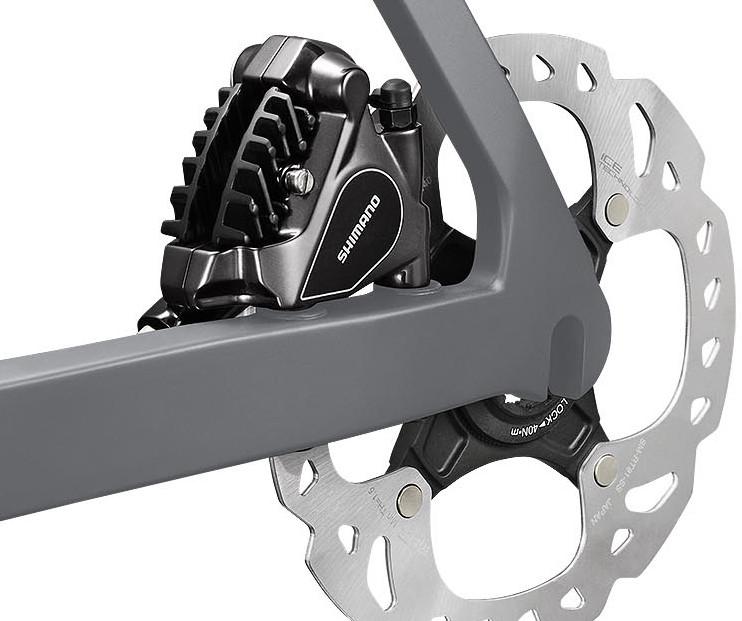
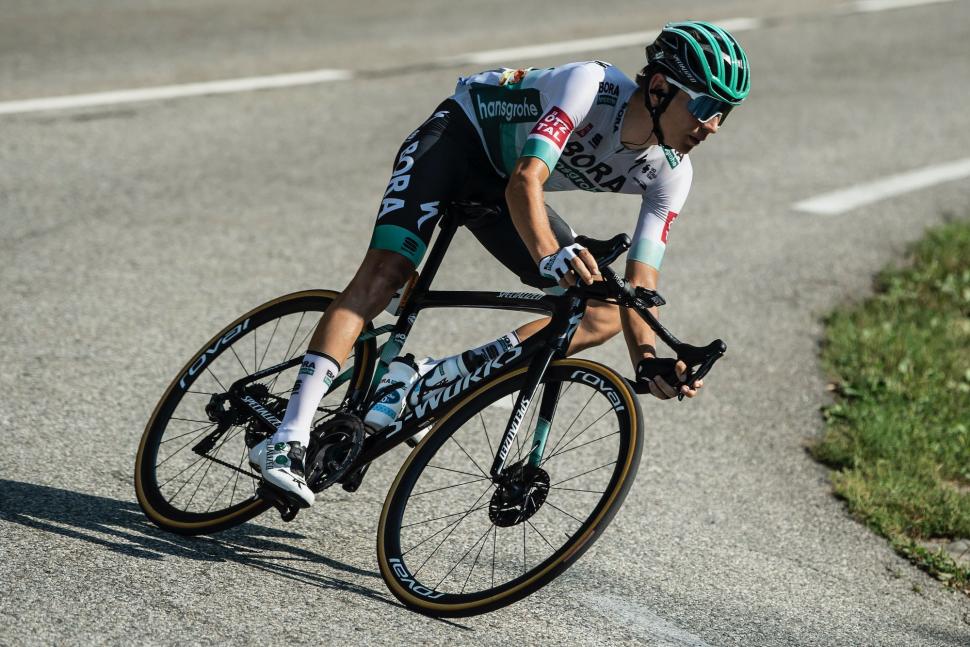
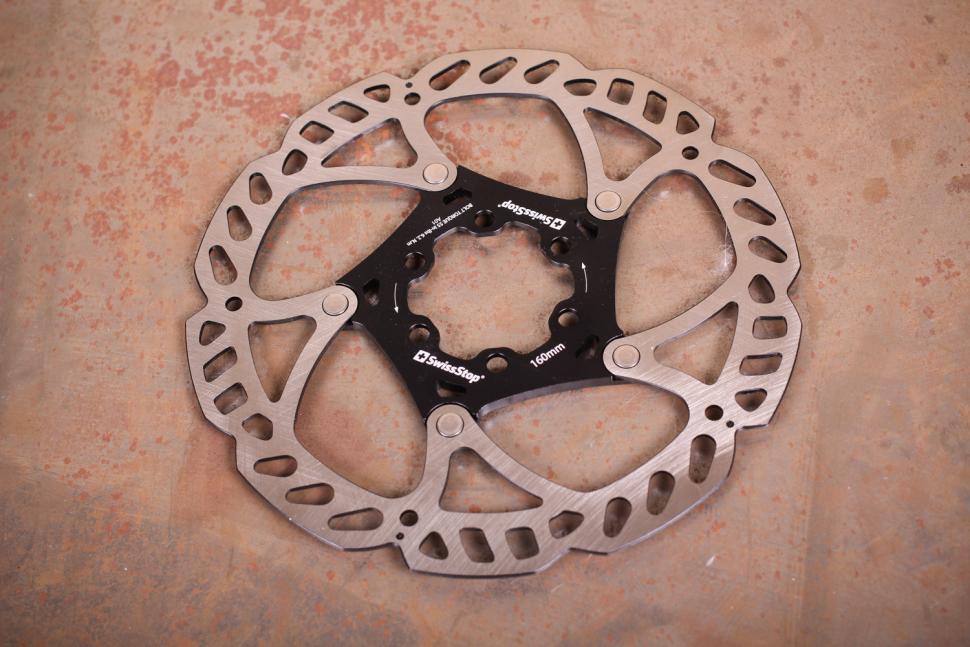
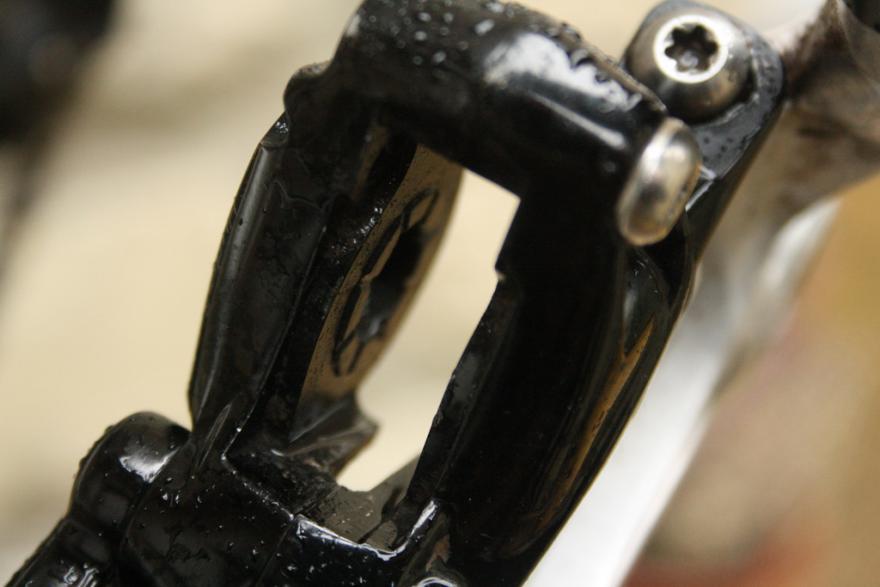
Add new comment
84 comments
seems likely that someone trying to break a record for a time trial would consider the most aero bike they could use. Otherwise someone else would come along and break te record by rusing the significantly more aero rim brakes.
But equally, aero benefit/ disadvantage of disc brakes is of little consequence to just about everyone riding who is not racing. I'm not sure why people go on about it so much.
Most people would make far more aero gains if they just set themselves up slightly lower at the front and did some flexibility/ strength training to be able to sustain such a position. Then they would just have to wait longer for their mates at the next junction than they currently do....
Claiming the difference between caliper and disc aerodynamically makes a difference to your average punter is just pointless unless people are looking at just about everything else first, such as their position, helmet/ clothing, frame, fork and wheels...
PP
Big ? It'll be immeasurable I'm the real world. The not very aerodynamic rider is by far the biggest drag factor. Braking systems - naah.
Errrrrrrrm no, no it isn't.
you choose your favourite carbon rims and rim brakes, i'll choose my favourite carbon rims and disc brakes, we'll head to a steep uk hill in the pissing rain and see who stops first. game?
When I learned in November that I was not going to get a replacement (anytime soon...) frame for my Ultimate Commuter, (with it's excellent Hope Tech 3 E4s), I got a set of Mavic Crossmaxxes so I could keep some life left in my last set of 26 inch XC717s on my Getting to Work Bike. I ride through a huge amount of filth on my commute.
Every time I use my quite well set up Curve Cantis I can hear the grinding and wear. Kool Stop Salmons too.
The rims have lost more than half of their "meat". They were only purchased for the winter, they might make it.
yeah, for mud and the like, disks are the best.
do keep an eye out for pad wear though, easy to miss that they are getting thin until you end up metal on metal. and it can happen fast-one descent in morzinr after rain was enough to destroy a set.
Two riders with equal ability.....the rim braked rider will beat the disc braked rider up.
On the way down - if the rim brake has the correct pads there will be
next to nothing in it.
You are saying in heavy rain the stopping distances will be the same ?
not with bloody carbon rims they won't be!
PP
UCI minmum weight limits can be met by bikes with disc brakes, so why would they be slower?
Or are we comparing non UCI legal rim brakes superbikes?
Aerodynamics at climbing speeds makes no difference. Bearing in mind disc and rim braked bikes can meet the UCI minimum weight limit, there will be no weight difference between the two riders either.
What exactly is the point you are trying to make? That a non UCI race, with no limit would see a difference? And who exactly will that have relevance to?
PP
I'm waiting for the road.cc head-to-head comparison. Get a few numbers down for weight vs aero vs stopping distance wet and dry.
And you could keep repeating the test and see whose rims fail first?
i think they are somewhat overkill on a fair-weather-only bike, but for a UK all season machine they are wonderful
i have my commuter and my Bike Friday 20" folder set up with (cabled) front disks, for the smaller 661 rim it removes the risk over overheating the tyre on the big downhills it encounters when i take it abroad
but, there's some downsides
like I said: i love them for year round use My spouse's fair weather machine -overkill. i was pushing for a good set of ultegra rim brakes, but no, she was convinced that disks were it. i got to pay the premium for something which we unlikely to encounter the conditions where disks make a difference
Just because you don't know how to ride a bike doesn't mean others don't.
So if you believe that discs are no more effective than rims, why do you believe that they are necessary on MTBs?
Why is "looking like a tractor" relevant? Even if that is "the truth of the matter" (which I certainly would not wish to defend), surely you are putting form before function on this point making it irrelevant.
That leaves only weight (in your OP), and as others have mentioned, if it falls within the minimum weight, again irrelevant.
At worst it seems that on high-end bikes at least, this either-or rather than no-contest.
Oh and look what I've just read on road.CC just to piss even more on your fire! Even a bloke who had his calf sliced open says how much better disc brakes are than rim....when racing....
Disk brakes all the way, it's the same reason cars have disk brakes and not drums anymore because drum brakes are as poor as rim brakes. I was rear ended by my mate on his rim braked bike, damaged both of our bikes, he was trying to brake at the same point as I did, no chance.
False analogy, firstly car brakes need to stop 1.5 tonnes of metal, not >100kgs worth of bike + rider, and drum brakes are demonstrably massively worse than discs on motor vehicles - but rim brakes aren't drum brakes (in fact what people tend to forget is that rim brakes actually are disk brakes, just the disk is the wheel).
Funny, I've never seen any of the rim-braked INEOS riders rearend their disk-equipped rivals even on the fastest descents, have you? I'd respectfully suggest that's more to do with your mate's lack of skill than his choice of brake.
If you want them that is fine, that is your choice, but anyone who claims you can stop better with disc brakes, has either had crap rim brakes previously or did not know how to set them up properly
Sorry, but like it or not this is the truth of the matter.
[/quote]
what utter rubbish you talk, disc brakes will out brake rim brakes all day long, that's the reality and truth
"A downside to disc brakes is the constant rubbing". Except if you fix it then it's not constant rubbing is it. Jesus wept.
Froome saying that the "technology isn't where it needs to be" (or similar) needs to be expended upon. What tech are you looking for, Chris?
The technology he's looking for is rim brakes.
Followed by having to flip flop his rear wheel to get to his climbing gears?
Excellent comment
I do think discs are the future (whether I personally like it or not) but I also agree that manufacturers need to do a lot more.
I don't buy the 'they only squeal if contaminated' excuse, they can make an absolute racket as soon as the rotor gets wet, something I notice that none of the usual 'how to' articles seem to acknowledge or address.
Also I have a set of relatively new Shimano brakes that developed warps and wibbles in the rotor just during bedding in (no, I'm not THAT much of a heavyweight) and I've had pistons stuck out even though the brakes were relatively new and had been regularly skooshed with isopropyl spray. Especially infuriating on a gravel bike when you might still end up on long road sections and maybe don't want to hear a constant tsk tsk tsk of a rubbing/warped rotor.
I need to move to discs on my CX bike, rim brakes were fine for summer gravel but I've just destroyed my rims in 3 months of muddy winter riding. I'll be going TRP Spyre because I don't care about absolute power but do appreciate being able to back pads off for muddy rides, and no lazy pistons!
I've got Spyres on my gravel / winter bike. Not as nice feel or power as hydraulic (which I have tried a couple of times on borrowed bikes) but a very good compromise and enough stopping power to test the tyres.
No bleeding, none of this stuff about needing to push pistons back in or cleaning deals with cotton buds. Each pad's distance from the disc is controlled by a screw, so the cable needs no adjustment. I can't say I adjust them any more than rim brakes - it's not often. They do howl in the wet. Grease on the back of the pads helps a bit. I haven't descended the Mortirolo fully laden (or indeed at all) but no issues with warped discs either.
Compared to the rim brakes on my summer bike (nothing high end) they're good enough, and the only slight irritation is having to be more careful when refitting a wheel as the disc, pads and caliper are less robust. I can't just pop the wheel back and wiggle it past the brake blocks.
I've had seized pistons and nasty rub on motorcycle hydraulic discs and it drove me crazy. Not keen to go back there.
This was my fear. For winter CX I'm hoping they'll be so full of mud and grit that it might dampen the squealing a bit!
I'm going to try 140mm Swissstop catalyst rotors, they're apparently very quiet. I'd also experimented in the past with fitting anti-squeal tape from automotive brake pads. It fits, but only if you take out the pad adjusters (they unscrew from the inside) so that lack of fine tuning will compromise performance. Worth a go, I'm a tinkerer at heart!
I've got Spyres on my gravel bike & they dont howl, so ymmv,I think different pad compounds do make a real difference on that point.
I'd happily swap my rim brakes out on my all weather commuter for Spyres instead, (the frame will take them it's just the total cost makes a new bike far more appealing) But just riding on UK roads in winter and not even with any hills or heavy braking points,it would be weekly maintenance to keep rim blocks working,almost daily rim cleaning to remove pickup,and I'd get through rim blocks like they were made of butter, my Spyre maintenance regime is I turn a screw every so often when the lever travel feels too long.
Which pads are you using? I'd love to fix this and have tried several pads from different brands but all that varies is the note they sing...
Pages